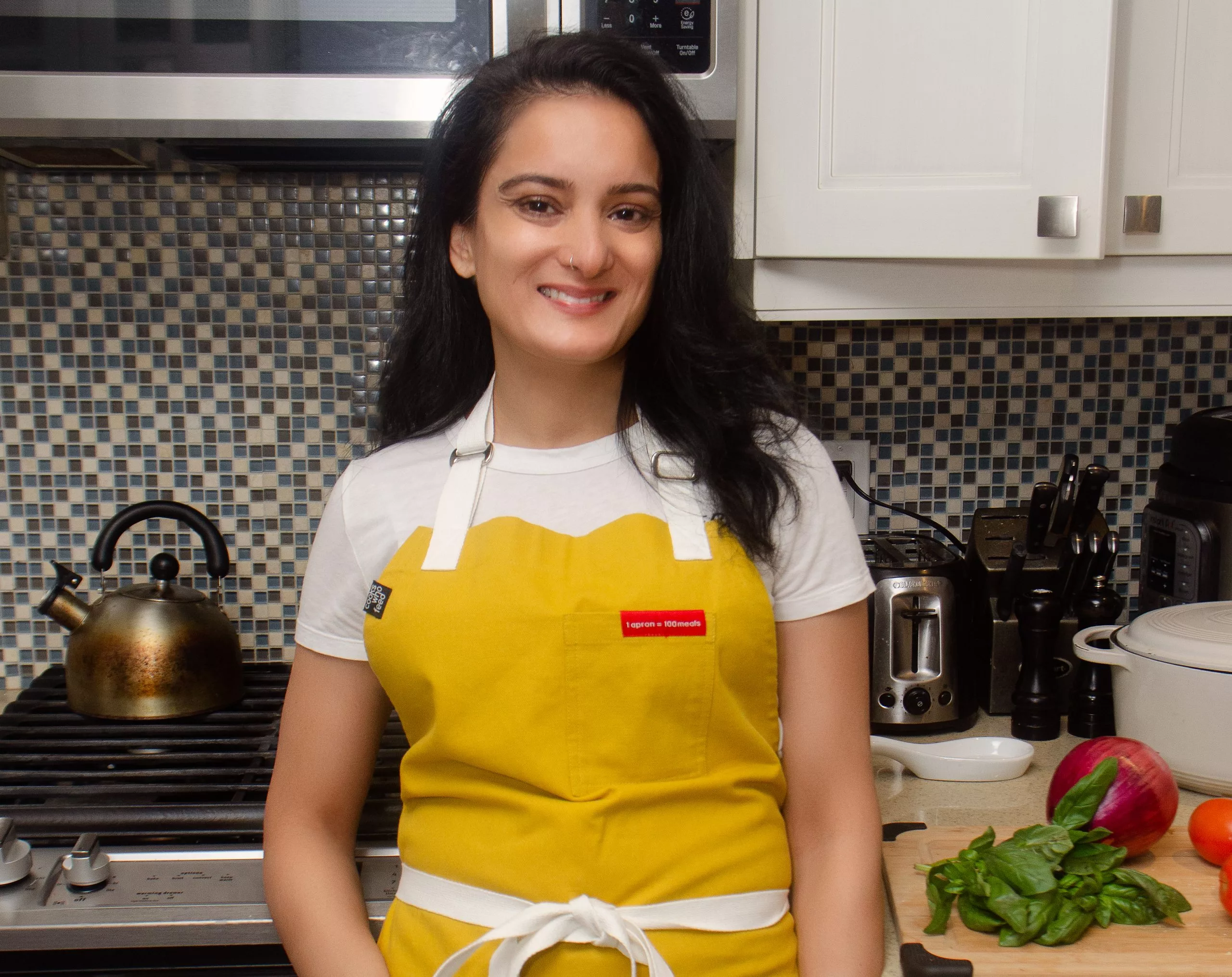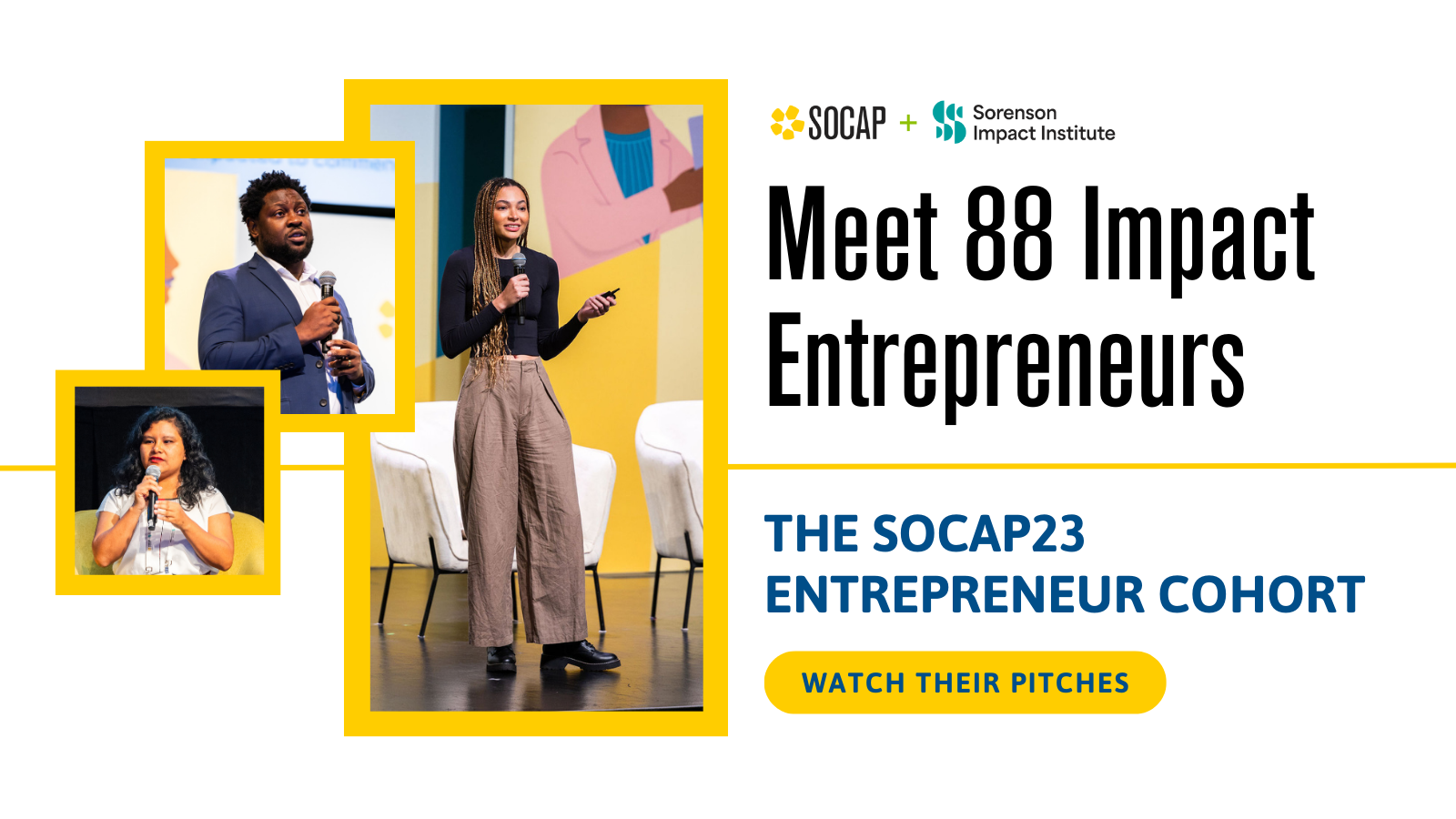Astonished by the amount of food wasted globally and the millions of lives that go hungry daily, entrepreneur Seema Sanghavi felt compelled to fight against world hunger and lead social change. Thus, she founded Cooks Who Feed — a social enterprise that reduces food waste through the sale of handmade, eco-friendly aprons. For every apron sold, 100 meals are fed to the hungry using rescued food waste through the help of Sanghavi’s three charity partners: Second Harvest in Canada, Rescuing Leftover Cuisine in the US, and Feeding India.
Sanghavi’s for-profit business model is focused on both social and environmental impact. It all began when a friend from India invited her to visit an NGO she founded, which provided safe and fair work to marginalized women with the goal of getting them out of poverty. “Being connected to my friend in Delhi, India, provided an opportunity for me to employ these women as artisans for my aprons,” Sanghavi says. “I felt that if I was going to truly immerse myself in this endeavor of starting my own business, social responsibility had to begin from the bottom up. I urge every aspiring entrepreneur to lay the foundation for social change early on, and carry it forward from production all the way to the consumer’s end experience with your product.” When the consumer receives one of her aprons, Sanghavi explains, the consumer also receives a thank you card signed by the woman who handmade that apron — a personal touch that enhances their ‘feel-good’ experience.
“I felt that if I was going to truly immerse myself in this endeavor of starting my own business, social responsibility had to begin from the bottom up.” — Seema Sanghavi
Pursuing her vision of creating a hunger-free world following the most sustainable path possible, Sanghavi was looking for responsible sourcing for the fabrics of her aprons. Given the shift in consumer mentality towards more sustainable, eco-friendly products, she hopped on this trend with good conscience. To produce the aprons, only local, natural, and recycled fabrics are used.
As Sanghavi describes it, “From the moment the fabric hits the sewing machine to the time it ends up in your kitchen, our eco-friendly aprons have employed poor women, fed their families, reduced food waste, and fed 100 people. That’s a lot for one apron.”
Learning about Cooks Who Feed’s sustainable business model, strategy, and responsible sourcing can bring you to the very question of funding. How did Sanghavi begin bringing this initiative to life, and what were her sources of financial aid?
“Building credibility is the number-one business asset you should develop straight from the get-go. Otherwise, you won’t get anything from anyone.” — Seema Sanghavi
“I got started through my Kickstarter campaign, which is an excellent source of seed-funding for any project you plan to develop,” says Sanghavi. “It’s also a wonderful way to confirm you have a market for your product. Once I hit my goal, I moved forward with production on a larger scale. None if it would be possible without the support of my family and friends, who connected me to great contacts along the way. Afterwards, I hired an intern to work on my PR strategy and communications plan to gain free media press. You’ll be surprised at how many emails we sent out. Only about 5 percent replied, but those 5 percent helped set us on a trajectory to success. We managed to close a deal with some celebrity chefs such as Chef Dev and Chef Romain Avril; we collaborated with them to produce custom branded aprons under their name. It was a win-win. Having reputable chefs advocate for our aprons helped us gain credibility as a startup, and in turn, helped strengthen their own personal brands for being involved in our social enterprise. So, whenever you go into a business meeting, always know the benefit you can provide the other party while capitalizing on your own strengths. Building credibility is the number-one business asset you should develop straight from the get-go. Otherwise, you won’t get anything from anyone.”
Sanghavi also mentioned that if you’ve graduated from a university or college, leveraging the relationships with alumni and staff can be extremely beneficial. Most recently she participated as an Alumni guest at the Schulich Startup Night event and won the $5000 grand prize. All she had to do was ask to participate — it was that easy. The lesson here: don’t be afraid to reach out to some old friends and show your curiosity; being keen can take you to great places.
All in all, Sanghavi is a driver of brand innovation, value creation, and positive impact, whose journey and mission holds valuable lessons. She is a testament that small acts of kindness through a socially responsible business can impact hundreds of lives globally. Remember, when getting started you should leverage your already existing connections and build credibility by collaborating with professionals who believe in your mission and vision. Push your ordinary boundaries to bring your idea to life — whether it be waking up early in the morning, reaching out to old friends to ask for a helping hand, or attending seminars you wouldn’t have otherwise attended.
When you believe in what you’re doing, and are passionate about the cause you are supporting, it’s so much easier to keep at it and handle the ups and downs for starting your own business.





